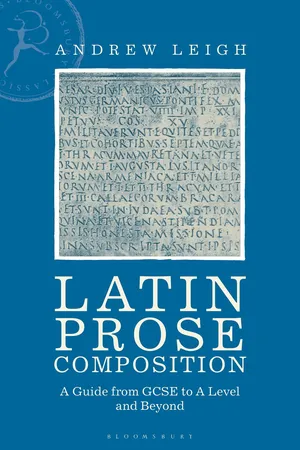
- 248 pages
- English
- ePUB (mobile friendly)
- Available on iOS & Android
About this book
This book helps students to write Latin using increasingly complex forms of expression. Part 1 gives guidance and practice exercises for the new sentences required at GCSE, while Parts 2 and 3 contain a series of chapters of grammatical introduction and exercises for translation into Latin leading up to A Level and Pre-U. Part 4 takes students into more advanced areas of composition. Continuous passages are included from an early stage alongside stand-alone sentences. Leigh gives clear guidance on the characteristic features of Latin prose, such as word order and subordination, as well as more advanced grammatical complexities. At the back of the book, lists of vocabulary and accidence provide reference and revision tools for students at all levels. Working through the book the rewards of learning to write Latin are clear: not merely a challenge to be overcome, prose composition gives a heightened appreciation of how Latin authors used the language to express themselves in their own particular styles.
Frequently asked questions
- Essential is ideal for learners and professionals who enjoy exploring a wide range of subjects. Access the Essential Library with 800,000+ trusted titles and best-sellers across business, personal growth, and the humanities. Includes unlimited reading time and Standard Read Aloud voice.
- Complete: Perfect for advanced learners and researchers needing full, unrestricted access. Unlock 1.4M+ books across hundreds of subjects, including academic and specialized titles. The Complete Plan also includes advanced features like Premium Read Aloud and Research Assistant.
Please note we cannot support devices running on iOS 13 and Android 7 or earlier. Learn more about using the app.
Information
Part One
GCSE
1
Writing Latin at GCSE (Eduqas)
Verbs
| present | amat | he/she/it loves; is loving |
| imperfect | amabat | he/she/it was loving; used to love |
| perfect | amavit | he/she/it has loved; loved |
| present | amant | they love; are loving |
| imperfect | amabant | they were loving; used to love |
| perfect | amaverunt | they have loved; loved |
Exercise 1A
Nouns: subject
Exercise 1B
Nouns: object
Order of words
Exercise 1C
Table of contents
- Cover
- Half-Title Page
- Series Page
- Title Page
- Contents
- Preface
- Part One GCSE
- 1 Writing Latin at GCSE (Eduqas)
- 2 Writing Latin at GCSE (OCR)
- Part Two AS Level
- 3 First Steps Beyond GCSE
- 4 More on Verbs
- 5 Pronouns I
- 6 Comparative and Superlative Adjectives and Adverbs
- 7 Participles
- 8 Temporal Clauses I
- 9 Pronouns II
- 10 Commands, Exhortations and Wishes
- 11 Direct Questions
- 12 Time and Place
- 13 Indirect Statements
- 14 Purpose Clauses
- 15 Result Clauses
- 16 Indirect Commands
- 17 Indirect Questions
- 18 Impersonal Verbs
- 19 Verbal Nouns and Gerunds
- 20 Gerundives
- 21 Gerundives of Obligation
- 22 Clauses of Fearing
- 23 Conditions
- 24 Temporal Clauses II
- 25 Causal and Concessive Clauses
- Part Three A Level and Beyond
- 26 Correlative and Comparative Clauses
- 27 Wishes II and Precaution
- 28 Further Case Usages
- 29 Verbs of Preventing, quominus and quin
- 30 Some Uses of Pronouns
- 31 Oratio Obliqua or Indirect Speech
- 32 A-Level-Style Prose Composition
- 33 Beyond A Level
- 34 Extended Passages
- Reference Grammar
- Vocabulary
- Index
- Copyright